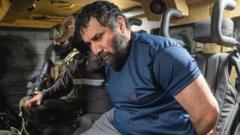In a distressing account, Kilmar Ábrego García's lawyers assert he suffered severe mistreatment in a notorious El Salvador prison after an incorrect deportation. Following his return to the U.S. to face human trafficking charges, he has maintained his innocence, bringing attention to alleged human rights abuses in the Central American prison system.
Allegations of Torture Emerge from El Salvador Prison Case

Allegations of Torture Emerge from El Salvador Prison Case
Kilmar Ábrego García claims he was tortured and abused during wrongful detention in an El Salvador prison, sparking legal action against the Trump administration.
Kilmar Ábrego García, a Maryland resident, has brought serious allegations to light regarding torture and abuse during his detention in El Salvador's infamous Terrorism Confinement Centre (CECOT). After being mistakenly deported in March 2025 and later extradited back to the U.S. in June to face human trafficking charges—charges to which he has pleaded not guilty—García's lawsuit filed by his wife claims he endured severe beatings from prison guards upon his arrival.
Court documents reveal that within just 24 hours of being placed in the overcrowded and unsanitary conditions of CECOT, García sustained visible injuries. His lawyers assert that García, along with 20 other deportees, was subjected to extreme punishment, including being forced to kneel for extensive hours while guards struck anyone who fell due to exhaustion.
Despite claims from El Salvador's President Nayib Bukele that the prisons are devoid of violence and sanitary issues, the conditions described by García are in stark contradiction. His mistreatment reportedly led to a significant weight loss of about 30lbs (14kg) within his first two weeks in prison.
While the Trump administration previously characterized him as a member of the MS-13 gang, a claim his family and legal counsel vehemently deny, García's journey has taken many twists. After initially being granted protection from deportation in 2019 due to fears of gang violence, he was wrongfully deported and held in a facility that has been widely criticized for its treatment of inmates.
The lawsuit, initiated by his wife, seeks to hold the Trump administration accountable for the distressing ordeal. However, the administration has requested the federal judge in Maryland oversee the case's dismissal on the grounds that events have progressed post his return to the U.S. The case highlights ongoing concerns regarding the treatment of deportees and the implications of immigration policies on human rights.
As proceedings continue, legal experts note that the case raises complex questions about accountability and the conditions faced by individuals caught in the crossfire of immigration enforcement.






















